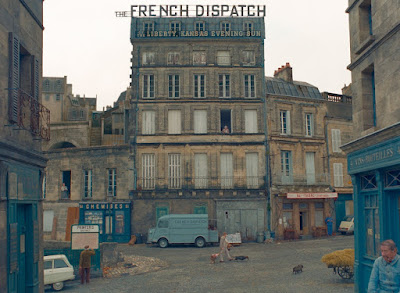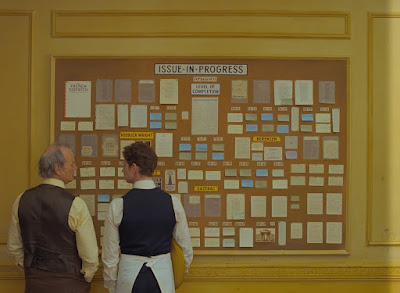'The French Dispatch' is the most Wes Andersony film that Wes Anderson has ever Wes Andersoned.
Fans of Anderson adore his playful storytelling, his quirky sense of satirical humour, distinctive visual style and his tendency to invite back favourite actors from previous projects.
All of those ingredients are there in 'The French Dispatch' - although the film finds the writer director playing with the anthology format for the first time in his career, delivering three short stories instead of one.
A Francophile's homage to his own country's respected magazine 'The New Yorker,' Anderson has built the movie around the concept of a magazine founded in France inititally as a supplement for the Liberty, Kansas Evening Sun.
Known for its commitment to high quality journalism about travel, politics, highbrow and lowbrow arts, gastronomy and stories of general human interest, the magazine's beating heart is Bill Murray's Arthur Howitzer Jr whose father owned the Kansas Evening Sun and indulged his decision to morph the supplement into a publication in its own right.
The French Dispatch has become a celebrated outpost of great American journalism located in the fictional French city of Ennui-sur-Blase.
Always keen to spot and encourage talent, Howitzer Jr has some basic rules he imparts to every writer he brings on board.
There can be no crying in his office.
Journalists are also encouraged to "just try to make it sound like you wrote it on purpose."
Framed around Howitzer's death in his office in Ennui-sur-Blase, Anderson builds the film around the final edition of the magazine which will die with its editor's passing.
A prologue gives us the background to Howitzer's journalistic institution and an epilogue shows his loyal team of journalists mourning his passing and crafting a tribute to their editor and mentor.
Sandwiched in between are a brief travelogue through Ennui-sur-Blase on a bike with Owen Wilson's Herbsaint Sazerac and three stories based on articles appearing in the final edition.
The first, entitled 'The Concrete Masterpiece by JKL Berenson' is based on a French Dispatch story about Benicio del Toro's jailed murderer turned celebrated postmodern artist Moses Rosenthaler who is also played as a younger psycho by Tony Revolori from 'The Grand Budapest Hotel'.
It is narrated by Tilda Swinton's Berenson as she delivers a lecture about the artist.
Jailed for decapitating two bartenders offscreen, Rosenthaler falls for Lea Seydoux's prison guard Simone in Ennui-sur-Blase who becomes his muse, posing nude for his paintings while he serves his sentence.
However his work becomes celebrated on the outside when a former inmate, Adrien Brody's art dealer Julien Cadazio brings his postmodernist take on the nude painting to public attention with the help of some benefactors, Henry Winkler and Bob Balaban's Uncles Joe and Nick.
Representing Rosenthaler and Simone's interests on the outside, Cadazio is shocked when the work he commissions doesn't quite turn out how he imagined.
The next tale is 'Revisions to the Manifesto by Lucinda Krementz' about an article Frances McDormand crafts about a quirky student movement that challenges the Ennui-sur-Blase authorities.
Fashioned around a charismatic leader, Timothee Chalamet's Zeffirelli, the students mount what becomes known as "the Chessboard Revolution," erecting barricades in the city and engaging the Mayor in games of chess which determine the tactics deployed on the city's streets.
McDormand's rather staid Krementz observes the rise of the student movement and surprisingly embarks on an affair with Zeffirelli after being invited to the home of his parents, Cecile de France and Guillaume Gallienne's Mr and Mrs B for dinner.
Admirers of her writing, they want to set her up on a date with Christoph Waltz's art collector Paul Duval but she absconds with Zeffirelli instead.
As the student movement frets over its direction, events come to a head during a "Chessboard Revolution" protest where Lyna Khoudri's bolshy student leader Juliette questions the revisions Krementz has made to Zeffirelli's manifesto.
The final curio is called 'The Private Dining Room of the Police Commissioner by Roebuck Wright'.
In this episode, Jeffrey Wright's cross between James Baldwin and the food writer AJ Liebling recounts the story of an extraordinary meal he had involving a kidnapping, a siege, a car chase and a remarkable chef.
Roebuck Wright reveals when they are not fighting crime, the Ennui-sur-Blase police are fuelled and inspired by the gastronomic genius of Stephen Park's Lieutenant Nescaffier.
Summoned to a private dinner created by Nescaffier with Matthieu Amalrac's Commissaire, it is rudely interrupted after the first course with the news that his host's son, Winston Ait Hellal's Gigi has been kidnapped by a cartel of the city's criminals.
The cartel have been unnerved by the arrest of their accountant, Willem Dafoe's Albert the Abacus.
Tracking the gang responsible down to the top floor of a four storey house, a siege develops with Edward Norton's guitar playing criminal mastermind The Chauffeur and Saoirse Ronan's Principal Showgirl among those holding the boy hostage.
Handcuffed to a pipe in a tiny room, Gigi uses his knowledge of Morse code to arrange for Nescaffier to feed not just him but his kidnappers after he has served the Commissaire, Roebuck Wright and police nearby an exquisite, elaborate meal of several courses.
However the meal he delivers isn't quite what they expect.
Fans of Wes Anderson's work will adore the quirky humour of his 'Tales of the Unexpected' style stories in this portmanteau film.
With its tongue in cheek, occasionally grotesque humour, its vibrant use of colour and angular stylised visuals, 'The French Dispatch' really feels like one for the fans and may not win him many converts.
It also feels very dense and you suspect there is so much going on in each frame it is impossible to absorb it all in one screening.
As is the case with portmanteau films, fans will have their favourite stories.
While each tale has its merits, 'The Concrete Masterpiece' is, in this reviewer's opinion, the standout tale, closely followed by 'The Private Dining Room of the Police Commissioner'.
Some sequences in 'Revisions to the Manifesto' feel as if they are padded out but there is nevertheless plenty to enjoy.
But while he draws on many familiar elements and themes from previous films, Anderson also pushes the boat out stylistically.
Not only is the narrative structure new but he blends tableau vivant (where seemingly static images suddenly come to life), 'Tintin'-esque animation and tales shot in 4:3 black and white with occasional splashes of vibrant colour filmed in CinemaScope.
Flitting in mid conversation between dialogue mostly in English but occasionally in French, its subtitles also appear in the top of the screen and sometimes ascend rather than descend.
The highly stylised humour and intricate detail of 'The French Dispatch' will no doubt irritate some viewers but Anderson fans will find the movie as rich as one of Nescaffier's celebrated meals.
Not only does it come across as a leftfield take on Roald Dahl's TV anthology series 'Tales of the Unexpected' but there is the same sense of genre bending mischief as Terry Gilliam and some nicely judged arthouse nods to European filmmakers like Francois Truffaut, Jean Luc Goddard, Vittorio Da Sica, Alfred Hitchcock, Jacques Tati, Luchino Visconti and Georges Clouzot.
Anderson is blessed to have cinematographer Robert D Yeoman involved who conjures up some memorably quirky shots.
Adam Stockhausen's production design, Stephanie Cressend's art direction and Milena Canonero's costume designs are also top drawer.
The cast also have a ball.
Swinton, Brody, Seydoux and del Toro are particularly good in the first story and McDormand, Chalamet and Khoudri are to a certain extent enjoyable in the second.
Wright, Amalric, Ait Hellal, Norton, Ronan and Park are delightful in the final tale.
Owen Wilson, Jason Schwartzman as the French Dispatch's cartoonist, Elisabeth Moss as its copy editor, Fisher Stevens and Griffin Dunne as a chief sub-edtor and legal advisor also amuse.
And it's fun to see Revolori, Winkler, Balaban, Larry Pine, Waltz, de France, Alex Lawther, Rupert Friend, Defoe, and Liev Schreiber turn up in minor roles and hear Anjelica Huston's voice as a narrator.
Murray is, of course, the glue that binds 'The French Dispatch' together and he delivers a typically laid back performance dripping occasionally with sarcasm.
Jarvis Cocker also contributes to Alexandre Desplat's soundtrack, with a version of the French pop star Christophe's 1965 hit 'Aline'.
Some of Anderson's critics will no doubt dismiss 'The French Dispatch' as a piece of frippery, with all the soul of a boutique hotel.
However dig deeper and you will see an affectionate tribute to a golden age of journalism and especially to magazines - specifically the New Yorker.
Not only is Roebuck Wright modelled on two writers but Howitzer is based on Howard Ross who helped establish The New Yorker, Sazerac is a nod to the magazine's Joseph Mitchell and Brody's art dealer is a version of Lord Duveen who was the focus of a six-part profile in 1951.
Krementz's 'Chessboard Revolution' story not only mimics the panache and pretentiousness of French New Wave cinema but affectionately parodies articles written in the New Yorker about the student revolution in Paris in 1968.
The mostly black and white storytelling visuals in each tale is an ode to black and white print, with bursts of colour when a colour is referenced bringing the story to life.
Related viewings and the passage of time will ultimately tell if 'The French Dispatch' is as clever and as durable as Anderson's film suggests.
The film will not be everyone's cup of tea (or tasse du the, if you insist).
However in an era of 'Fast and Furious' and Marvel movies, it's good that there is still space in cinema for Anderson's distinctive and daring vision and voice.
It may not be mainstream.
Nor does it want to be but long may Anderson continue.
('The French Dispatch' opened in US, UK and Irish cinemas on October 22, 2021)
















Comments
Post a Comment